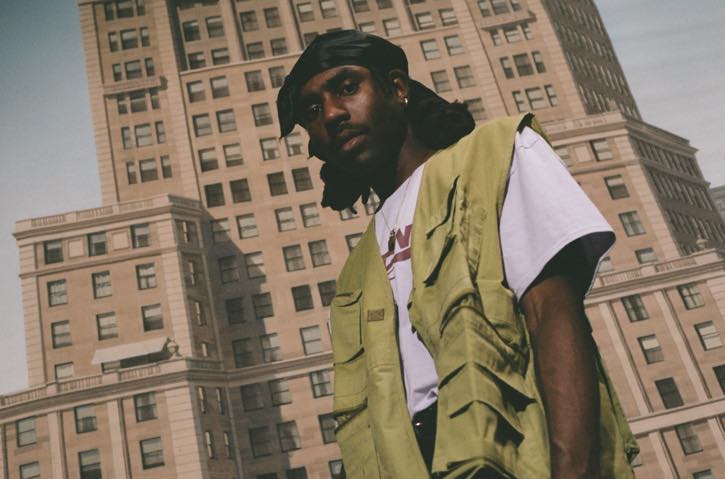"I've always believed that just because someone writes the song, they're not the one who finishes it," says Dev Hynes, aka Blood Orange, "or [is] even necessarily the best person to interpret it."
A unique point of view, such a philosophy can have radical implications in the hands of an artist like Hynes, whose best work thrives on collaboration. Like his previous two records, his latest, Negro Swan, is overflowing with guests: A$AP Rocky, Porches' Aaron Maine, Adam Bainbridge (aka Kindness), Tei Shi and even Puff Daddy all make appearances.
Instead of tasking each with fulfilling his vision, Hynes cedes control to his collaborators, allowing them to interpret the song for themselves, often taking tracks in radically new directions. "I'm not necessarily the creator or the finalizer," he insists, just the glue holding the whole thing together. "Everyone that I try and work with kind of shifts everything. They bring to it more than what I'm giving."
Case in point: while working on the track "Runnin'," which Hynes intended as a song about depression and suicide, Georgia Anne Muldrow added the lyrics, "You're going to be okay. Everybody goes through it." "That completely shifts the tonality of the song and I didn't get that," he says. "So I can't even take credit for the meaning of that song, because she's the one who took it to that place."
That willingness to give up control extends to the audience as well. "I know what I was thinking when I was writing it and everything," he explains, "but I also went out of my way to write things that could be taken by any person." He uses the line "No one wants to be the negro swan," from "Charcoal Baby," as an example. "Every way that anyone wants to interpret that line is correct. It's all applicable."
Yet Hynes is far less willing to acquiesce when it comes to the presentation of his music. If he had his way, audiences would go into each of his records blind, without context from press releases or singles. "As a fan of things, I like experiencing things that way," he says. "But I'm not allowed to do that."
He relented and released a pair of videos last month, directing the clip for "Jewelry," a song he says "hits all four corners of the album," himself (the album's cover image, a black man hanging out a car window wearing white angel wings, came from same shoot). But a press release describing the record as "an exploration into my own and many types of black depression, an honest look at the corners of black existence, and the ongoing anxieties of queer/people of color," accompanied the album's announcement, much to his chagrin.
Hynes doesn't deny that those themes are present, "but I wouldn't say that it's an album about depression, because there were other things that were on my mind too." By issuing a quote like that, "it looks like it's some kind of proclamation. That's against why I do what I do."
A unique point of view, such a philosophy can have radical implications in the hands of an artist like Hynes, whose best work thrives on collaboration. Like his previous two records, his latest, Negro Swan, is overflowing with guests: A$AP Rocky, Porches' Aaron Maine, Adam Bainbridge (aka Kindness), Tei Shi and even Puff Daddy all make appearances.
Instead of tasking each with fulfilling his vision, Hynes cedes control to his collaborators, allowing them to interpret the song for themselves, often taking tracks in radically new directions. "I'm not necessarily the creator or the finalizer," he insists, just the glue holding the whole thing together. "Everyone that I try and work with kind of shifts everything. They bring to it more than what I'm giving."
Case in point: while working on the track "Runnin'," which Hynes intended as a song about depression and suicide, Georgia Anne Muldrow added the lyrics, "You're going to be okay. Everybody goes through it." "That completely shifts the tonality of the song and I didn't get that," he says. "So I can't even take credit for the meaning of that song, because she's the one who took it to that place."
That willingness to give up control extends to the audience as well. "I know what I was thinking when I was writing it and everything," he explains, "but I also went out of my way to write things that could be taken by any person." He uses the line "No one wants to be the negro swan," from "Charcoal Baby," as an example. "Every way that anyone wants to interpret that line is correct. It's all applicable."
Yet Hynes is far less willing to acquiesce when it comes to the presentation of his music. If he had his way, audiences would go into each of his records blind, without context from press releases or singles. "As a fan of things, I like experiencing things that way," he says. "But I'm not allowed to do that."
He relented and released a pair of videos last month, directing the clip for "Jewelry," a song he says "hits all four corners of the album," himself (the album's cover image, a black man hanging out a car window wearing white angel wings, came from same shoot). But a press release describing the record as "an exploration into my own and many types of black depression, an honest look at the corners of black existence, and the ongoing anxieties of queer/people of color," accompanied the album's announcement, much to his chagrin.
Hynes doesn't deny that those themes are present, "but I wouldn't say that it's an album about depression, because there were other things that were on my mind too." By issuing a quote like that, "it looks like it's some kind of proclamation. That's against why I do what I do."




